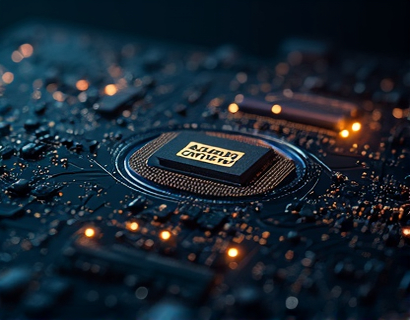Smart Contract Solutions for Pegged Token Creation and Seamless DeFi Exchange on UCASH
In the rapidly evolving landscape of blockchain technology, smart contracts have emerged as a pivotal innovation, particularly in the creation of stable digital currencies pegged to UCASH and the facilitation of seamless decentralized finance (DeFi) exchanges. This article delves into the intricacies of how smart contract technology is transforming the crypto economy, offering secure, efficient, and user-friendly solutions that set a new standard for digital asset management and trading.
Smart contracts, self-executing contracts with the terms of the agreement directly written into code, have revolutionized various aspects of decentralized finance. When applied to the creation of stablecoins pegged to UCASH, these contracts provide a robust framework that ensures the stability and reliability of the digital currencies. UCASH, a leading cryptocurrency, has been at the forefront of leveraging smart contracts to enhance the stability and flexibility of its ecosystem.
Understanding Pegged Tokens and Their Importance
Pegged tokens are digital assets that maintain a fixed value relative to a stable asset, in this case, UCASH. The primary purpose of these tokens is to provide a stable store of value and a medium of exchange, mitigating the volatility associated with traditional cryptocurrencies. By pegging tokens to UCASH, users can benefit from the stability of UCASH while still enjoying the flexibility and accessibility of digital currencies.
The creation of pegged tokens through smart contracts involves several key steps. First, a smart contract is deployed on a blockchain network, such as Ethereum, which defines the rules and mechanisms for maintaining the peg. This contract includes algorithms and protocols that automatically adjust the supply of the token to maintain the peg against UCASH. The smart contract ensures that for every token issued, a corresponding amount of UCASH is locked in a reserve, providing collateral and assurance of the token's value.
Smart Contract Mechanisms for Pegged Token Creation
The smart contract used for creating pegged tokens to UCASH typically includes several critical components. One of the primary functions is the reserve management system. This system locks a specified amount of UCASH in a smart contract wallet, which serves as collateral for the issued tokens. The ratio of tokens to UCASH in the reserve is maintained at a predefined level, usually 1:1, to ensure the peg remains stable.
Another essential feature is the automatic adjustment mechanism. This mechanism monitors the market price of UCASH and adjusts the supply of the pegged token accordingly. If the price of UCASH increases, the smart contract may burn excess tokens to reduce supply and maintain the peg. Conversely, if the price decreases, the contract may mint new tokens to increase supply, ensuring the peg is upheld. These adjustments are executed automatically and transparently, reducing the risk of human error and manipulation.
Enhancing Decentralized Finance with Pegged Tokens
The integration of pegged tokens into the DeFi ecosystem significantly enhances its stability and functionality. DeFi platforms can utilize these stable tokens for a variety of financial instruments, including lending, borrowing, and decentralized exchanges. The predictability and stability of pegged tokens make them ideal for these applications, as they reduce the risk associated with price volatility.
For instance, in a decentralized lending platform, users can borrow and lend pegged tokens with confidence, knowing the value will remain stable relative to UCASH. This stability facilitates more predictable borrowing and lending rates, encouraging greater participation in the DeFi space. Additionally, the use of smart contracts ensures that all transactions are transparent, secure, and executed without the need for intermediaries, reducing costs and increasing efficiency.
Seamless Bidirectional Trading
One of the most significant advantages of smart contract-based pegged tokens is the facilitation of seamless bidirectional trading. Users can convert pegged tokens to UCASH and back to tokens without the need for centralized exchanges or intermediaries. This bidirectional functionality is crucial for maintaining liquidity and ensuring that users can easily access their assets in the form they prefer.
The smart contract manages the conversion process by automatically updating the balances in the user's wallet and the reserve. When a user decides to convert tokens to UCASH, the smart contract deducts the corresponding amount of tokens from the user's wallet and credits UCASH to their account. Conversely, when converting UCASH to tokens, the contract debits UCASH from the user's account and credits the pegged tokens to their wallet. These transactions are instantaneous and verified by the blockchain, providing a high level of security and trust.
Benefits of Smart Contract Pegged Tokens
The adoption of smart contract solutions for pegged token creation and DeFi exchanges offers numerous benefits. Firstly, the decentralized nature of smart contracts eliminates the need for central authorities, reducing the risk of censorship and increasing accessibility. Users from anywhere in the world can participate in the ecosystem without the barriers imposed by traditional financial systems.
Secondly, the transparency and immutability of blockchain technology ensure that all transactions are recorded and verifiable. This level of transparency builds trust among users and reduces the potential for fraudulent activities. The automated and rule-based nature of smart contracts also minimizes the risk of human error and manipulation, enhancing the overall reliability of the system.
Furthermore, the use of smart contracts reduces transaction costs significantly. Traditional financial systems often involve high fees for intermediaries such as banks and exchanges. In contrast, smart contracts execute transactions directly on the blockchain, eliminating these intermediary fees and making financial operations more cost-effective.
Challenges and Considerations
While the benefits of smart contract pegged tokens are substantial, there are also challenges and considerations that need to be addressed. One of the primary concerns is the security of the smart contracts themselves. Any vulnerabilities in the code can be exploited, leading to potential losses for users. Therefore, rigorous testing and auditing of smart contracts are essential to ensure their security and reliability.
Another consideration is the regulatory environment. As the use of cryptocurrencies and DeFi platforms grows, regulatory bodies are increasingly scrutinizing these activities. Compliance with local and international regulations is crucial to ensure the sustainability and legitimacy of the ecosystem. Developers and platforms must stay informed about regulatory changes and adapt their solutions accordingly.
Future Prospects and Innovations
The future of smart contract pegged tokens and DeFi exchanges looks promising, with ongoing innovations set to enhance their functionality and adoption. One area of focus is the development of cross-chain interoperability, allowing pegged tokens to be used across different blockchain networks. This would further increase liquidity and accessibility, making the ecosystem more robust and user-friendly.
Another exciting development is the integration of advanced financial instruments, such as derivatives and synthetic assets, built on top of pegged tokens. These instruments can provide additional tools for users to manage risk and enhance their investment strategies within the DeFi space.
Additionally, the user interface and experience (UI/UX) of DeFi platforms are being improved to make them more accessible to a broader audience. Intuitive and user-friendly interfaces will encourage more cryptocurrency enthusiasts and newcomers to engage with DeFi solutions, driving widespread adoption.
Conclusion
Smart contract technology is at the forefront of transforming the crypto economy, particularly in the creation of stable pegged tokens and the facilitation of seamless DeFi exchanges. By leveraging the power of blockchain and smart contracts, platforms can offer secure, efficient, and user-friendly solutions that enhance the stability and flexibility of digital currencies. As the technology continues to evolve, it is poised to play an increasingly significant role in shaping the future of decentralized finance, providing robust and intuitive financial tools for users worldwide.










































